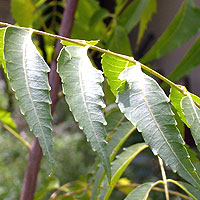Neem
 © Sebastian Pole
© Sebastian PoleParts Used & Where Grown
The neem tree, a member of the Meliaceae family, appears to have originated in India and Southeast Asia and been spread throughout drier lowland tropical and subtropical regions of Africa, the Middle East, the Americas, Australia, and South Pacific islands. The leaves, used as medicine, are generally available all the year round as the tree is evergreen except during severe droughts or if exposed to frost.
- Reliable and relatively consistent scientific data showing a substantial health benefit.
- Contradictory, insufficient, or preliminary studies suggesting a health benefit or minimal health benefit.
- For an herb, supported by traditional use but minimal or no scientific evidence. For a supplement, little scientific support.
Our proprietary “Star-Rating” system was developed to help you easily understand the amount of scientific support behind each supplement in relation to a specific health condition. While there is no way to predict whether a vitamin, mineral, or herb will successfully treat or prevent associated health conditions, our unique ratings tell you how well these supplements are understood by the medical community, and whether studies have found them to be effective for other people.
For over a decade, our team has combed through thousands of research articles published in reputable journals. To help you make educated decisions, and to better understand controversial or confusing supplements, our medical experts have digested the science into these three easy-to-follow ratings. We hope this provides you with a helpful resource to make informed decisions towards your health and well-being.
This supplement has been used in connection with the following health conditions:
| Used for | Amount | Why |
|---|---|---|
Gingivitis | Apply a gel containing 2.5 to 5.0% extract twice per day | Neem gel has been shown to be effective at reducing plaque and bacterial levels in the mouth. |
Peptic Ulcer | 30 to 60 mg of freeze-dried bark extract twice per day | Neem bark extract led to a significant reduction in stomach acid levels and near complete healing of all people with duodenal ulcers in one trial. |
Tooth Decay | 1 gram of leaf extract in gel applied to teeth twice per day | Neem leaf extract has been shown to reduce plaque and bacteria levels in the mouth. |
Vaginitis | Use a cream containing seed extract, saponins of Sapindus mukerossi (reetha), and quinine hydrochloride (5 ml applied vaginally once at bedtime) | In one trial, a cream containing neem seed extract, saponins of reetha, and quinine hydrochloride eliminated all symptoms in 10 of 14 women with chlamydia. |
Traditional Use (May Not Be Supported by Scientific Studies)
Neem has a long history of use in the traditional medical systems of India (Ayurvedic, Unani-Tibb).1 Neem leaf and bark extracts are most consistently recommended in ancient medical texts and by herbal practitioners for gastrointestinal upsets, diarrhoea and intestinal infections, skin ulcers and infections, and malaria.2 Neem twigs are the most regularly used toothbrush for a large portion of the population of India and other countries where the tree is common.3 The effectiveness of many of these uses has been confirmed in modern research studies, showing, for example, that neem bark extracts are effective for people with stomach ulcers, that leaf gel can effectively fight periodontal disease, and that leaf extracts can combat scabies infections.4, 5, 6 The claimed contraceptive effects of neem have been confirmed in some animal studies showing that seed extracts of neem are spermicidal.7
Copyright © 2024 TraceGains, Inc. All rights reserved.
Learn more about TraceGains, the company.
The information presented by TraceGains is for informational purposes only. It is based on scientific studies (human, animal, or in vitro), clinical experience, or traditional usage as cited in each article. The results reported may not necessarily occur in all individuals. Self-treatment is not recommended for life-threatening conditions that require medical treatment under a doctor's care. For many of the conditions discussed, treatment with prescription or over the counter medication is also available. Consult your doctor, practitioner, and/or pharmacist for any health problem and before using any supplements or before making any changes in prescribed medications. Information expires December 2024.



 We are proud to announce that
We are proud to announce that  As the market evolves, customers increasingly request a wider variety of omega-3 options for their lipid...
As the market evolves, customers increasingly request a wider variety of omega-3 options for their lipid...  Maintaining healthy glucose levels is crucial for preventing metabolic conditions like diabetes,...
Maintaining healthy glucose levels is crucial for preventing metabolic conditions like diabetes,...  Looking at formulating a new vitamin blend? Discover
Looking at formulating a new vitamin blend? Discover 







































